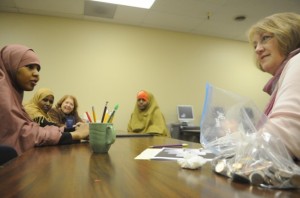Widgetized Section
Go to Admin » Appearance » Widgets » and move Gabfire Widget: Social into that MastheadOverlay zone
Somali women learn about finances, English language at Faribault classes
 The discussion about bargain hunting and shopping responsibly was going rather smoothly, even after one student admitted to simply tossing out sale flyers that would appear in her mailbox.
The discussion about bargain hunting and shopping responsibly was going rather smoothly, even after one student admitted to simply tossing out sale flyers that would appear in her mailbox.
But then the students — a group of Somali women learning more about American culture — responded with blank stares when Carolyn Treadway pointed out a “great coupon” on one page of a grocery store flyer.
“You know what a coupon is, right?” Treadway, director of So How Are the Children, asked the women.
“I think I’ve seen them in the movies, but no, what are they?” replied Bisharo Farah, a senior at Faribault High School.
Moments like that one are what make the courses, which have been held nearly every Friday since January, so important, said United Way director Marcia Morris-Beck.
“There are so many things in American culture that we just take for granted,” she said. “It’s very eye-opening when you start to realize what Somali people just don’t know.”
Treadway agreed.
“There are so many things we just assume people know,” she said. “But you just saw it, these smart women didn’t realize how easy it can be to save some money, something many of the rest of us are trying to do every day.”
Treadway and Morris-Beck started the classes at the request of a number of Somalis who were attending ESL classes through Treadway’s SHAC, an organization that supports community collaborations that increase opportunities for Faribault’s immigrant, refugee and economically-disadvantaged youth.
Adult Basic Education, which is located in Faribo Town Square, offered up its meeting room, and Faribault Community Education listed the class in its winter catalog.
Each week, a speaker from a different area agency was invited to speak and share information with the class. One week the women learned about healthy living and ways to incorporate exercise into their daily routine. Another week they learned how to help their children get the most out of their schooling.
“The idea was to give them a chance to practice their English in a more conversational way,” Morris-Beck said. “But this is also about providing them with some useful resources to help them better adapt.”
And although the class has had at most 10 participants, Treadway knows the information gathered each week is then spread around the Somali community. Farah said she appreciated the opportunity to get out into the community and learn new things just as much as being able to go home and share the information with her friends and family.
“There’s just so many things you don’t know, and this has been very helpful,” said Farah, who came to the U.S. seven years ago from Kenya.
Sitting next to Farah was Halima Pakane, who’s been in the U.S. for about four years. For Pakane, the classes have helped her learn more about exercise options as well as local opportunities to grow a garden.
This Friday marked the last scheduled class, though two dates that were canceled due to weather are expected to be rescheduled soon.
The organizers hope to host the class again next fall. Those interested in participating in the class may contact Carolyn Treadway at ctreadway@aol.com or 507-334-3817.
Reach reporter Rebecca Rodenborg at 333-3128, or follow her on Twitter.com @FDNRebecca

Figradihiina